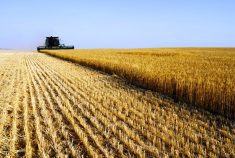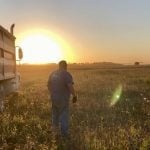Canadian farm income may have set a new record in 2023.
That’s according to the official 2023 and 2024 estimates released February 16 by Agriculture and Agri-Food Canada.
For 2023, net cash income (NCI), the main metric Agriculture and Agri-Food Canada uses to measure farm income, is forecast to have increased 13 per cent to a new record of $24.8 billion.
In a media release AAFC noted that growth in expenses and income was forecast to be “much more modest” than 2021 and 2022, but the growth in farm receipts outpaced the increase in expenses, resulting in a new record for net cash income.
Read Also

Faster growth for farmland values in first half of 2025 says FCC
Canadian farmland values rose by an average of six per cent in the first half of 2025 according to a new report from Farm Credit Canada.
The strong economic performance for production agriculture came against a challenging backdrop, AAFC noted, including a drought in Western Canada, extreme weather events across the country and global conflicts such as the war in Ukraine.
AAFC’s release stated “…this continued growth of overall farm income shows that despite the uncertainty and volatility of the past year, the sector remains resilient.”
The largest driver of this expected increase is a forecasted increase in livestock receipts of almost 10 per cent, to $37.3 billion.
Cattle receipts saw price-driven growth that, combined with moderate growth in receipts from the supply-managed sector, more than offset an expected decline in hog receipts.
Crop receipts were also forecast to have grown four per cent to $56.0 billion, as improved crop production largely mitigated declining prices.
Operating expenses are forecast to have increased only two per cent to $74.9 billion, well below the 20 per cent increase seen in 2022. While some key inputs, such as labour and interest expenses, were seen to have continued increasing, others, such as fertilizer and fuel expenses, are expected to have come down.
Similar results are expected for average net operating income (NOI) per farm, which is forecast to have increased by 17 per cent in 2023 to $155,000, compared to $132,000 in 2022. This increase is 34 per cent above the 2018-2022 average.
Average farm family income, which includes income earned off-farm, is forecast to have increased by 11 per cent to $239,000 in 2023. Increases in average NOI are expected for all farm types except for hog farms and poultry and egg farms.
Looking ahead to 2024, net cash income is forecast to decline 14 per cent to $21.3 billion, as cash receipts are forecast to fall slightly, with expenses modestly increasing, although net cash income would still be 28 per cent above the 2018-2022 average.
Under the assumption of a normal production year, crop receipts are expected to decline five per cent as prices continue to fall. Livestock receipts are forecast to continue increasing, but at a much less aggressive rate of two per cent, as growth in cattle prices is forecasted to slow down.
Average farm and farm family incomes are expected to follow a similar trend.
–Gord Gilmour is Sr. Editor of News and National Affairs for Glacier FarmMedia. He writes from Winnipeg.
















